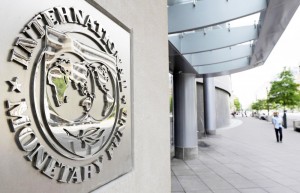Washington (AFP) — The International Monetary Fund stepped up its warnings Monday on risks to the global economy, mainly from the crisis-mired eurozone, as it trimmed its growth forecast for the rest of the year.

IMF economists said that the frail situations in Spain and Italy especially could quickly turn worse amid market doubts over eurozone leaders’ resolve in implementing pledged reforms.
But they also pointed to the US “fiscal cliff” trajectory which, if not corrected, could crunch the US economy and heavily impact the rest of the world.
“In the past three months, the global recovery, which was not strong to start with, has shown signs of further weakness,” the fund said in its quarterly economic forecast.
“Financial market and sovereign stress in the euro-area periphery have ratcheted up,” it said, while growth has fallen below expectations in a number of major emerging-market economies.
If policy reactions in major economies remain inadequate or too slow, the IMF said, fissures could deepen, they added.
“The main risk is obvious,” IMF chief economist Olivier Blanchard told reporters.
“It is that the vicious circle in Spain and Italy becomes stronger, that output falls even more than it does, that one of these countries loses its financial access to markets,” he told reporters.
“The implications of such an event could easily derail the world recovery.”
The IMF said that largely due to sharper-than-expected slowdowns in newly industrialized Asia and in large emerging economies like China, India, and Brazil, it had cut 0.1 percent off its April forecast for global growth, to a rounded 3.5 percent.
For 2013, the forecast is 3.9 percent, down from 4.1 percent.
Emerging economies were generally taking correct measures to deal with slowdowns, the IMF said. But many “have also been hit by increases in investor risk aversion and perceived growth uncertainty, which have led not only to equity price declines, but also to capital outflows and currency depreciation.”
Growth forecasts were also cut for the United States, to 2.0 percent; Britain, to 0.2 percent, and France, to 0.3 percent. In Spain, the recession will persist through 2013, the Fund said.
On the bright side, forecasts for this year for Germany and Japan were revised higher — to 1.0 percent and 2.4 percent, respectively, though the 2013 prediction for each was also trimmed slightly.
Also getting an upgrade was the Middle East and North Africa region, much of which has been struggling through deep political turmoil in the past two years. The IMF said the region would grow about 5.5 percent this year, much better than the 4.2 percent predicted in April.
The IMF said that major economies were making progress on cutting their fiscal deficit burdens, despite stiff challenges in risk-averse debt markets which have sent the borrowing costs of the troubled eurozone periphery countries skyrocketing.
The global lender reiterated its prescriptions of recent months: short-term fiscal balance targets for troubled economies like Spain and Italy can be de-emphasized to allow for growth while more focus is placed on medium-term adjustments and reforms.
“A steady pace of adjustment focused on the measures to be implemented rather than on headline deficit targets is preferable, especially in light of heightened downside risks to the outlook.”
Moreover, the IMF suggested, the political stress of too much austerity — set to meet fiscal targets — could backfire in countries with IMF or IMF-linked bailout programs, like Ireland, Portugal and Spain.
“The recent deterioration in the political and economic climate in Greece serves as a warning about the potential onset of ‘adjustment fatigue,’ which remains a threat to continued program implementation.”
Meanwhile the IMF singled out the overhanging risk from US political stasis that could send the country over a “fiscal cliff” due to laws that, if not changed, will force massive government spending cuts coupled with automatic tax hikes on January 1 which would severely crunch the world’s largest economy.
“Avoiding the fiscal cliff, promptly raising the debt ceiling, and developing a medium-term fiscal plan are of the essence,” the global crisis lender said in recommendations for the United States.



